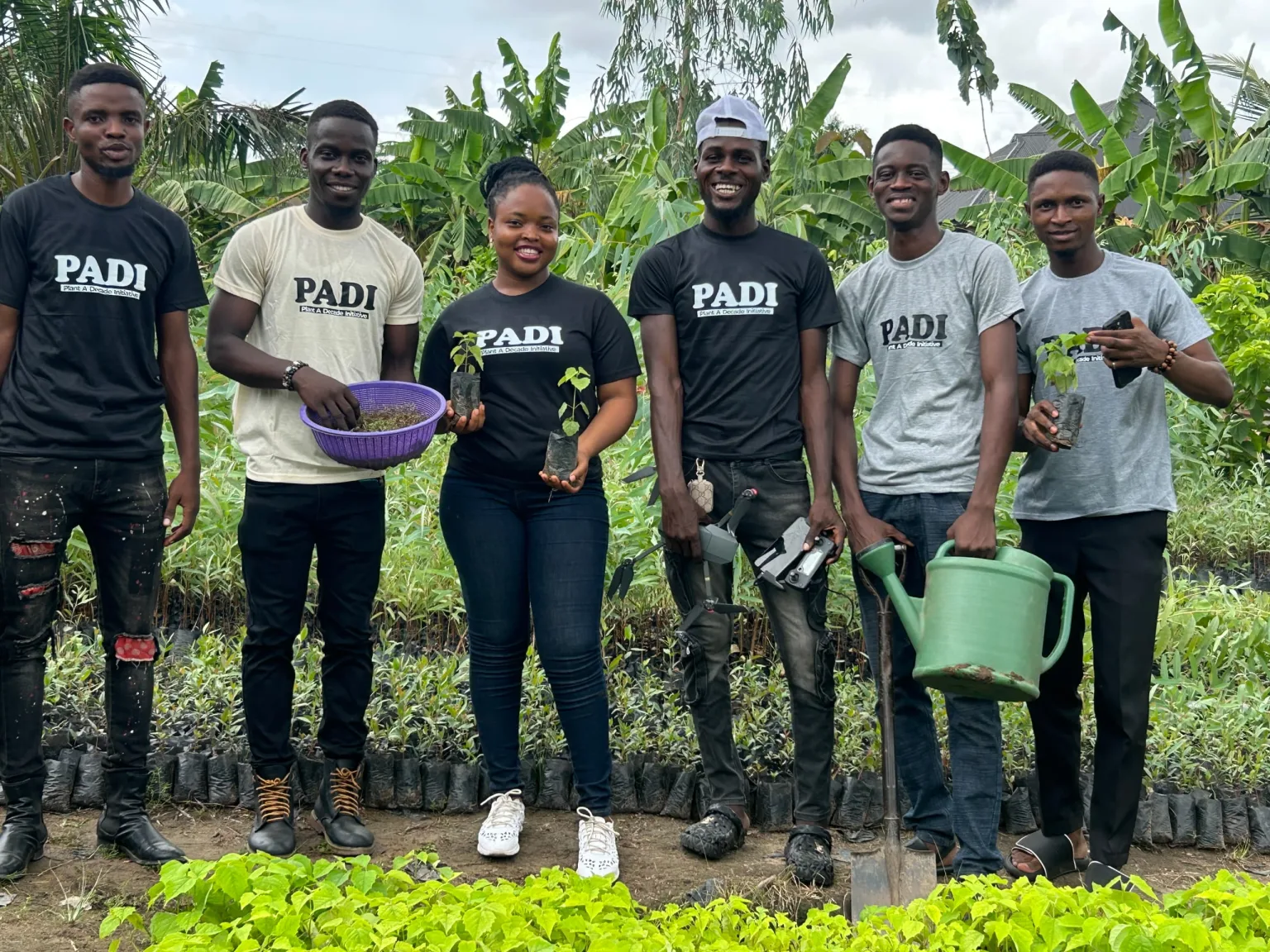The Plant A Decade Initiative (PADI) is born out of a deep commitment to bridging the information gap on climate education and catalysing tangible action towards environmental sustainability. Founded by Anuoluwapo Idowu, PADI is a youth-led initiative that recognises the urgent need to empower individuals with knowledge and resources to address pressing global challenges, particularly in the realm of climate change. This article delves into the mission, achievements, challenges, and aspirations of PADI as it endeavours to sow the seeds of positive environmental change through tree planting, education, and community engagement.
Aligned with the United Nations Sustainable Development Goals (UNSDGs), #13 (Climate Action), #15 (Life on Land), and #17 (Partnerships for the Goals), PADI has set forth a bold mission to plant 10,000 trees, symbolising a collective endeavour to mitigate climate change and conserve biodiversity. The urgency of this mission is underscored by the inter-connectedness of global environmental issues; as evidenced by the recent heat wave that swept through Nigeria, the impact of climate change transcends borders and affects us all. Moreover, PADI recognises the intrinsic link between environmental conservation and agricultural sustainability, particularly in Nigeria, an agrarian community with a rich agricultural heritage.
Historically, agriculture has been a cornerstone of Nigeria’s economy, contributing significantly to its Gross Domestic Policy. However, over time, the focus on agriculture has waned, leading to neglect and degradation of agricultural lands. In light of this, PADI endeavours to reignite the conversation around agriculture and forestry, recognising the symbiotic relationship between the two. Through initiatives like agroforestry, PADI seeks to integrate trees into agricultural landscapes, harnessing their multifaceted benefits to enhance soil health, prevent erosion, and promote water purification. By promoting agroforestry practices, PADI aims to revitalise Nigeria’s agriculture sector while simultaneously contributing to environmental conservation and climate resilience.
In essence, PADI’s motivation is rooted in a deep-seated commitment to fostering a harmonious relationship between humanity and nature. By planting trees, raising awareness, and forging partnerships, PADI endeavours to pave the way for a sustainable future where environmental conservation and agricultural sustainability go hand in hand, ensuring the well-being of present and future generations alike.
Key milestones
Since its inception, PADI has achieved significant milestones that underscore its commitment to environmental stewardship and community engagement. One notable achievement was the successful planting of 111 trees at the National Youth Service Corps permanent orientation camp in Benue State. This initiative, not only contributed to reforestation efforts, but also addressed the pressing issue of flooding in the region. By planting trees strategically, the initiative helps to mitigate the impact of flooding by highlighting the importance of environmental conservation in disaster risk reduction.
In addition to tree planting initiatives, PADI has conducted comprehensive awareness programmes reaching over 2,500 graduates and 500+ secondary school students across Nigeria. These programmes are aimed to educate participants about the importance of environmental conservation, climate change, and sustainable practices. By engaging with both graduates and students, PADI is cultivating a new generation of environmental advocates and change-makers, empowering them to take proactive steps towards a greener future.
Furthermore, it has organised numerous tree-planting campaigns in various locations, including Markudi and Apa local government areas in Benue State. These campaigns not only contribute to reforestation efforts, but also serve as platforms for community involvement and collaboration. Given Benue State’s agrarian nature and susceptibility to flooding, PADI’s tree planting campaigns play a crucial role in enhancing ecosystem resilience and mitigating climate-related risks. Currently, the initiative has expanded its impact to new regions, including Ibadan, where it plans to replicate its successful tree-planting model. With seedlings ready and the support of over 500 students from the University of Ibadan, PADI is primed to scale up its efforts and engage more communities in environmental conservation.

Additionally, PADI has forged partnerships with local media platforms, such as Immaculate Online TV, to amplify its message and reach a wider audience. Through these collaborations, PADI aims to raise awareness about climate change, advocate for sustainable practices, and inspire action both locally and globally. “At PADI, we are committed to addressing the pressing issues of biodiversity loss and climate change through our multifaceted initiatives”, said Idowu. “One of the fundamental challenges we have tackled is the pervasive misinformation and scepticism surrounding climate change. By providing accurate information and raising awareness about the reality and urgency of climate change, we lay the foundation for meaningful action. Awareness is key, as informed individuals are better equipped to contribute to climate action and adopt sustainable practices in their daily lives.
“Our tree planting initiatives serve as a tangible and impactful way to contribute to biodiversity conservation and climate change mitigation. Through strategic tree-planting campaigns, we not only replenish forests, but also create vital habitats for a diverse range of plant and animal species. Trees act as natural carbon sinks, sequestering carbon dioxide from the atmosphere and helping to mitigate the effects of climate change. Additionally, trees play a crucial role in purifying the air, cooling the atmosphere, and reducing energy consumption, thereby contributing to climate resilience and ecosystem health”, Idowu added.
Furthermore, the benefits of tree planting extend beyond environmental conservation to socio-economic empowerment. For example, the simple act of planting a tree can provide significant benefits to communities, such as improved air quality, enhanced aesthetics, and even economic opportunities through eco-sensitive power generation. By engaging communities in tree planting activities and promoting the value of environmental stewardship, PADI fosters a sense of ownership and responsibility towards the natural world.
Challenges
Implementing PADI projects has not been without its challenges, yet each obstacle has presented an opportunity for innovation and resilience. One significant hurdle has been the germination failure encountered while attempting to raise seeds into seedlings, Idowu noted. This setback is compounded by the capital-intensive nature of seedling cultivation. To address this challenge, PADI has forged partnerships with nurseries owners, leveraging their expertise and resources to ensure a more reliable supply of healthy seedlings for tree-planting initiatives.
Another pressing challenge has been the financial constraints associated with funding PADI campaigns and operations. “As the initiator of this initiative, I have personally funded many of PADI’s activities, highlighting the need for sustainable financing solutions”, she added. To overcome this challenge, the initiative is actively pursuing grant opportunities and writing proposals to secure funding for its projects. By diversifying its funding sources and tapping into external resources, PADI aims to alleviate the financial burden and ensure the continuity of its impactful initiatives.
Furthermore, PADI faces the challenge of addressing misconceptions and scepticism surrounding climate change among various stakeholders. Some individuals remain unconvinced of the urgency or existence of climate change, while others prioritise short-term gains over long-term sustainability. This poses a significant barrier to engaging landowners and garnering support for tree-planting efforts. In response, it has implemented comprehensive orientation and awareness campaigns, disseminating factual information about climate change and its implications. Through strategic communication and research-backed messaging, PADI seeks to foster a deeper understanding of environmental issues and inspire collective action.
Central to addressing these challenges is PADI’s unwavering commitment to teamwork and collaboration. Embracing the mantra that “Teamwork makes a dream work”, PADI mobilises collective efforts to overcome obstacles and achieve its goals. By fostering a culture of collaboration and shared responsibility, it harnesses the collective expertise and passion of its team members and partners, ensuring the success and sustainability of its initiatives. In summary, while challenges may arise, PADI remains steadfast in its determination to make a positive impact on the environment and communities. Through strategic partnerships, innovative financing solutions, and concerted outreach efforts, PADI navigates obstacles with resilience and determination, paving the way for a greener and more sustainable future.
Future outlook
PADI’s vision extends far beyond the borders of Nigeria, aiming to catalyse a global movement for environmental stewardship and climate action. At its core, PADI seeks to cultivate a community of leaders, who embody the values of climate advocacy, environmental stewardship, and proactive change-making. These leaders will not only champion PADI’s mission, but also drive transformative action in their respective communities, fostering a global mindset and collective responsibility for a sustainable future. On the operational front, the initiative is committed to expanding its reach beyond Nigeria to countries such as Kenya, South Africa, Uganda, Cameroon, and beyond.
These regions represent diverse ecosystems and communities that stand to benefit greatly from PADI’s tree-planting initiatives and climate awareness programmes. By extending its footprint across Africa and beyond, PADI aims to amplify its impact on biodiversity conservation, climate change mitigation, and sustainable development. Furthermore, PADI aspires to become a prominent voice in international fora and policy arenas, including the United Nations Environment Programme (UNEP) and the United Nations Development Programme (UNDP). By actively engaging with global stakeholders and contributing to the Sustainable Development Goals (SDGs) agenda, PADI seeks to elevate its profile as a leading advocate for environmental sustainability and community empowerment.
In pursuit of these ambitious goals, the initiative remains steadfast in its commitment to collaboration, innovation, and continuous improvement. Through strategic partnerships with local organisations, government agencies, and international bodies, it aims to leverage collective expertise and resources for maximum impact. Additionally, it will prioritise monitoring and evaluation to ensure the effectiveness and accountability of its global initiatives, fostering a culture of transparency and learning. As the initiative embarks on this journey towards global expansion and influence, it invites individuals and organisations alike to join hands in creating a more sustainable and resilient world. In conclusion, in a world grappling with the repercussions of climate change, initiatives like PADI exemplify the power of collective action and youth leadership in driving positive change. By nurturing a generation of climate advocates, planting trees, and fostering partnerships and paving the way for a sustainable future, where environmental stewardship and agricultural resilience go hand in hand.



